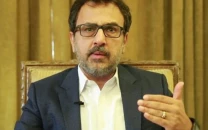Diploma mills running despite efforts: HEC chief
Senate panel to hold in-camera briefing on the issue due to ‘gravity of situation’

PHOTO: ARTWORK
Ahmed was responding to a question raised by Senator Azam Swati during a meeting on Wednesday of the Senate Standing Committee on Education and Professional Trainings.
“Degrees used to be issued like mobile SIMs, but the HEC has tried to control the menace and I can share the names of those influential people who are behind the institutions issuing such degrees and certificates,” he told the members.
HEC deadline to meet criteria ends on 30th
The HEC chief said he could share the details only in an in-camera meeting due the gravity of situation.
“We will not compromise on the quality of higher education and that is why so far we have blocked 110 PhD programmes in the country which were not meeting the criteria laid down by the HEC,” he added.
However, Senator Swati said there were three institutions in the capital which were befooling public in the name of technical and health education with their fake certificates, and their heads were publicising the business by sharing pictures with some federal ministers.
“Such institutions are bringing a bad name to the country. That is why some [provinces] want to run their own higher education bodies,” the chairperson said while referring to the higher education commissions of Punjab and Sindh.
He said it was sad that highly influential people were involved in such business and destroying the fabric of education, adding that in the next in-camera meeting all those names would be exposed. “I hope we will be able to take action against such mafias,” he added.
Tip of the iceberg
Ahmed’s confession reveals just the tip of the iceberg as even the HEC is struggling to lay its hands on all such institutions indiscriminately. There are 150 illegal universities and campuses mentioned on the HEC’s website and most of them continue to function without taking a non-objection certificate (NOC).
After 15 years: HEC still lacks proper mechanism to verify degrees
The 110 PhD programmes that the HEC has banned are run in some well-known universities like the International Islamic University Islamabad and the National Defense University. These universities do not have the required facilities and qualified faculty.
However, with the advent of provincial higher education bodies, an across-the-board action against illegal and fake institutions has become a problem because if the federal HEC bans their programmes, the provincial bodies issue NOCs to these institutions.
The Global Institute in Lahore was stopped from granting more admissions due to serious ‘academic irregularities’. But, according to sources in the HEC, the Punjab Higher Education Commission has recently issued NOC to the institute.
HEC dissolution: Who’s to say they’re not fake?
The Auditor General of Pakistan in its recent audit report revealed that the Federal Urdu University of Arts, Science and Technology (FUUAST) also issued fake degrees to more than 100 students who were either absent in examinations or failed in the BCom or BA examinations.
The FUUAST former vice chancellor had also allegedly plagiarised his PhD thesis but he had kept the charge despite clear findings of the HEC plagiarism committee and recommendations of the public accounts committee.
The HEC is reluctant to come hard on undergraduate programme of the public and private sector universities in the country as it fears it will open another Pandora’s Box of unending litigation and political pressures.



















COMMENTS
Comments are moderated and generally will be posted if they are on-topic and not abusive.
For more information, please see our Comments FAQ